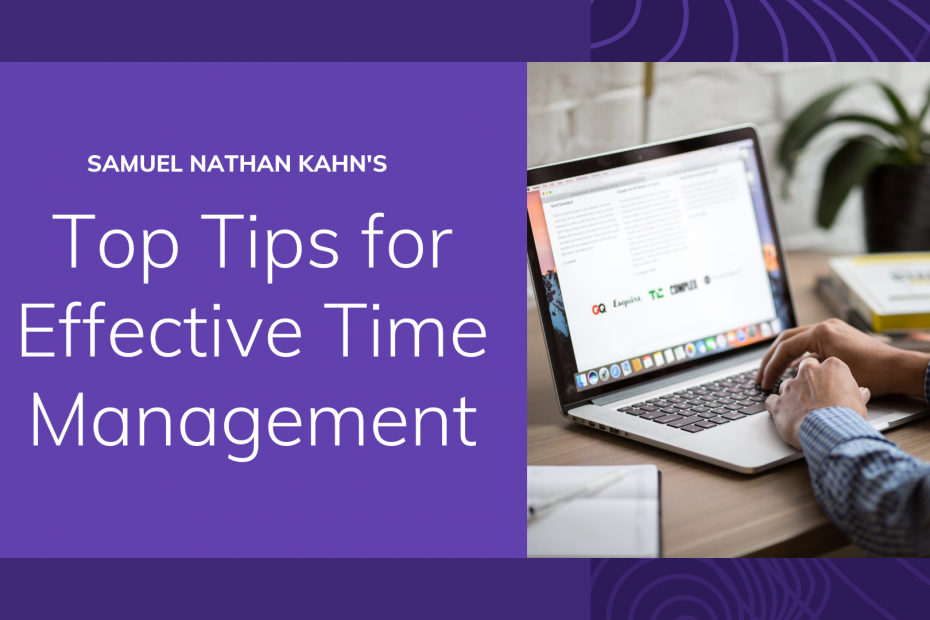Effective time management is necessary to run a successful business, according to Samuel Nathan Kahn. This doesn’t mean doing more things or doing them quickly, it means getting more of the important work done in a day.
Having effective time management is key to being able to maintain a healthy work and life balance, boost your personal productivity, and improving your employee’s performance. It can be something that takes years to master, but learning early on in your business could save you a lot of unnecessary stress later on.
Here are Sam Kahn’s top seven tips for ensuring that you are best utilising the time in your day:
- Proper Planning & Prioritization
Planning is the single most important aspect when it comes to effective time management. This could look like writing out all of the tasks that you wish to achieve by the end of the week, and distributing them across your week. Sam has found that creating daily plans or to-do lists can also be helpful as you can plan your whole day out in small manageable increments. You could also block out times and set hours for each task. Another option would be following a list from top to bottom of priority of importance, placing the important tasks first and leaving the not so urgent at the end. A way to best manage your goals is by using the SMART acronym. Making sure they are Specific, Measurable, Attainable, Relevant and Timely. Finding the way that works best for you will be a matter of trial and error over time.
- Manage Distractions
Minimising distractions in your physical environment and on your computer or phone will ensure you stay focused on the task at hand. You will begin to realise that your time management will depend on this, as you can lose hours in your day by scrolling through your phone, chatting to the person next to you in your office, or continuously checking your emails. This is not about completely eliminating distractions, it is simply about being aware of them and minimising them throughout the day. You could start with blocking out parts of your day for socialising or checking your phone specifically. This will support you in working towards your productivity instead of going against it.
- Delegating Tasks
Delegating tasks to other members of your team or contractors allows you to best leverage your time, focusing on tasks that only you can complete. As mentioned in a previous blog ‘Sam Kahn on Not Trying to be a Hero in Business’, delegation may seem like a daunting concept, it also empowers your team, builds trust, and assists with professional development. It also allows you to identify who is best suited to tackle tasks and projects. Not only can trying to do everything yourself be an inefficient use of time, it can also lead to burnout and stress. This can then lead to inconsistency and mistakes, so it is important to remember that delegation is the key to running an efficient and effective business.
- Taking Regular Breaks
Having breaks throughout your day is essential for ensuring your brain is fresh and allows you to avoid mental overload throughout the day. When you are planning out your week or daily tasks, it is vital that you schedule breaks in between tasks that are particularly important or require a lot of focus. This also allows for greater productivity and efficiency of tasks.
- Set Goals for Meetings
Meetings are a big part of running a professional business, regardless of the industry that you are in. Meetings can be very time consuming, so it’s best to head into them as prepared as you can. Ensure that the meeting is necessary, that you have a clear agenda of what you desire to accomplish from it, and a rough time frame of how long it should take. Whilst in the meeting, ensure you are on track and try to curb the distractions and conversations that are not relevant to the agenda of the meeting.
- One Task at a Time
When starting your day or moving onto a new task, it is important to ensure that you don’t try to do every task at once and focus on the one task at hand at a time. This is also important to remember when you are busy, as it will result in poor work quality and give you more stress. Ensure each task is broken up into small manageable tasks when you are doing the planning and prioritizing.
- Track your Day
The best way to know how you spend your time is to start tracking your days. You can do this by simply writing it down on a notepad, or you could use specific time management software. You could start by having a detailed plan of your week in the beginning, then tracking it as you work through it so that you can see where there is room for improvement. This will also support you in learning how long certain tasks take and give you an idea of where you could potentially be delegating tasks.
Effective time management is a skill that takes practice and trial and error to find what works best for you and your team. The better you become at delegating, planning and tracking, the easier it will become. For more business tips and advice, visit Sam’s website.
